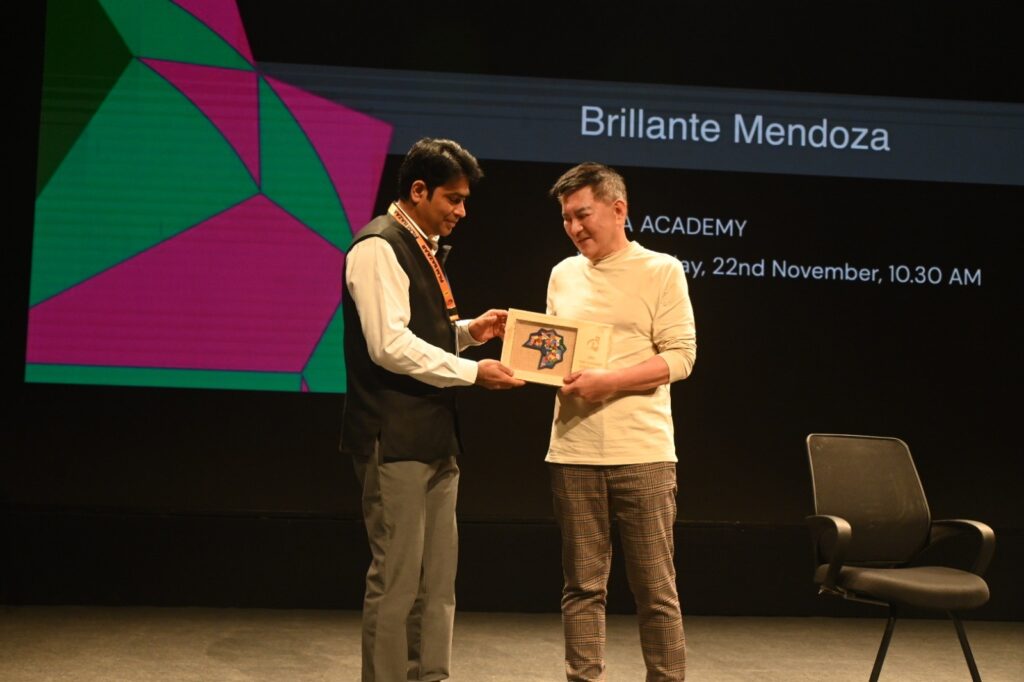
ndependent film-maker and one of the vibrant exponents of the Philippine New Wave cinema, Brilliante Mendoza took an enthralled audience through his unique process of film-making. Mendoza was leading the first Masterclass on the sidelines of the 54th International Film Festival of India in Goa.
The Masterclass began with a rare peek into behind-the-scenes groundwork of Mendoza’s widely acclaimed feature film, Ma’Rosa. Mendoza revealed that he prefers his story to guide his film rather than a set script.
In an extremely innovative and immersive process of character development, he elaborated, that he does not provide a script or set dialogues to his actors but simply places them into the organic situations of his characters. His brand of direction is guided by strong mutual trust where he allows the natural instinctive reactions of the actors to take over.
The actors do not know the destiny of the characters and become truly one with the humanity of the characters they portray.
The characters become alive as the actors experience life in the shoes of the character within the beautiful cinematic world that Mendoza weaves.
Speaking about his production design, Mendoza shared that every detail in his production comes together to tell a story.
He disclosed that he uses no artificial sets but only actual locations to remain absolutely authentic to his characters.
Though personally indifferent to titles, Mendoza’s brand of cinematography and overall film-making has often been called ‘ultra-realistic.’ He mentioned that he uses no tripod but his camera simply follows the character, giving the perspective of an onlooker who is intimately integrated with the narrative. Mendoza sees cinema through the lens of truth and realism.
He mentioned that he firmly believes that cinema should reflect life as it unfolds.
In fact, he shared, that one of his feature films got mistakenly incorporated into the ‘Documentary’ section at a film festival. A mistake that he took as a compliment, said Mendoza.
Sound in his films is a character in itself, he shared. Subtly woven into the scenes, it is completely organic and has an identity of its own.
It is never removed and helps the viewer to hear and feel the environment of the story.
Speaking about the editing process, Mendoza said that it is the third and final stage of his three-stage film-making process that begins with idea and preparation and then progresses to shoot and production. In the editor’s table the film is woven together, hooking scenes where every scene seamlessly flows into the next, he explained.
Talking about himself as a filmmaker, Mendoza divulged that he did not begin film-making until he was forty-five years old.
His long background in advertising which is guided by sales and product enhancement that is often superficial made him want to explore the complete opposite in his films.
He revealed that authenticity is the primary pivot of his films and he does not try to be appealing rather chooses to be equally inspired from the sad, the ugly and the beautiful, when telling stories.
He shared that he has no formal training and only uses his experiences to guide him.
He remarked that his turning point came when his debut feature film The Masseur connected with the audience. He shared that the film was a truthful story of his country when he went closest to his roots.
It became a part of his identity. “I believe in cinema. I believe that cinema can change lives for the better,” expressed Mendoza. The Masseur went on to win the Golden Leopard at Locarno (2005).
He shared that he makes films for the people and leaves it up to them to define his films. Speaking about Indian audience, he mentioned that they connect with the stories he is trying to tell. “If a person connects with a film, it becomes part of his life, that is the power of story-telling,” said Mendoza.
Addressing aspiring directors, he said, “You must find yourselves as film-makers and remain true to your craft.” “It is not going to be easy. Film-making is not just a passion but a commitment to say truthful stories,” he added.









